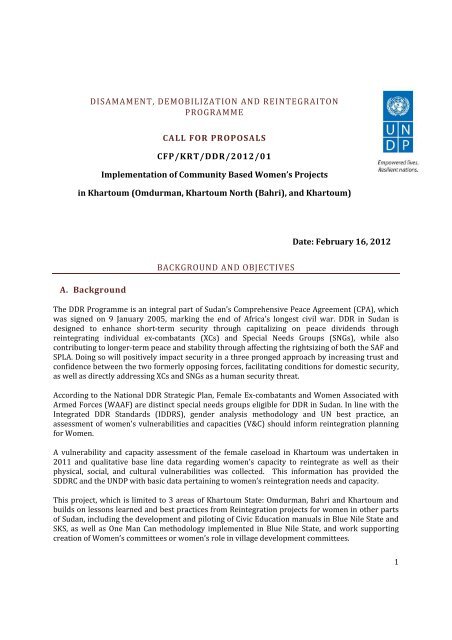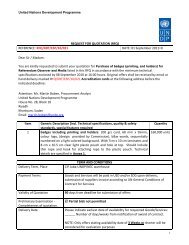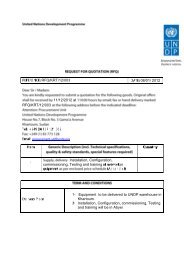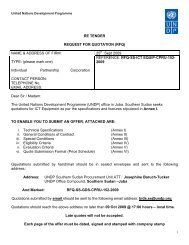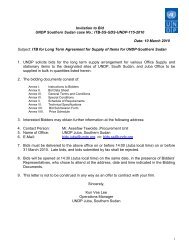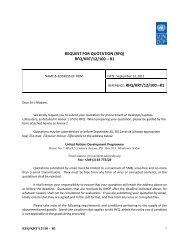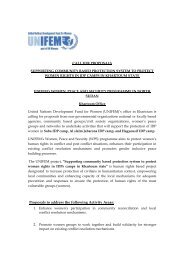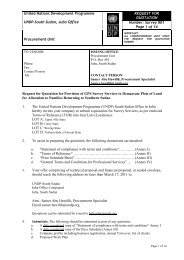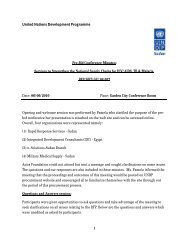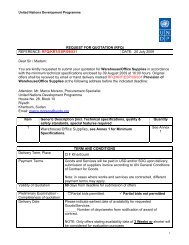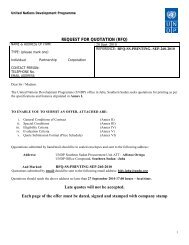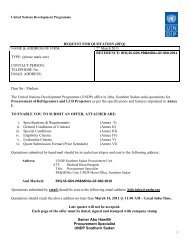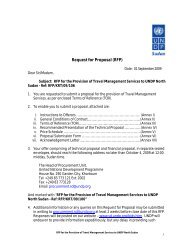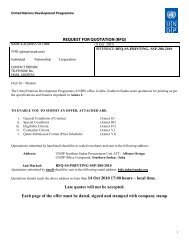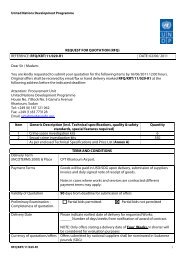Implementation of Community Based Women's Projects in Khartoum ...
Implementation of Community Based Women's Projects in Khartoum ...
Implementation of Community Based Women's Projects in Khartoum ...
Create successful ePaper yourself
Turn your PDF publications into a flip-book with our unique Google optimized e-Paper software.
DISAMAMENT, DEMOBILIZATION AND REINTEGRAITON<br />
PROGRAMME<br />
A. Background<br />
CALL FOR PROPOSALS<br />
CFP/KRT/DDR/2012/01<br />
<strong>Implementation</strong> <strong>of</strong> <strong>Community</strong> <strong>Based</strong> Women’s <strong>Projects</strong><br />
<strong>in</strong> <strong>Khartoum</strong> (Omdurman, <strong>Khartoum</strong> North (Bahri), and <strong>Khartoum</strong>)<br />
BACKGROUND AND OBJECTIVES<br />
Date: February 16, 2012<br />
The DDR Programme is an <strong>in</strong>tegral part <strong>of</strong> Sudan’s Comprehensive Peace Agreement (CPA), which<br />
was signed on 9 January 2005, mark<strong>in</strong>g the end <strong>of</strong> Africa’s longest civil war. DDR <strong>in</strong> Sudan is<br />
designed to enhance short‐term security through capitaliz<strong>in</strong>g on peace dividends through<br />
re<strong>in</strong>tegrat<strong>in</strong>g <strong>in</strong>dividual ex‐combatants (XCs) and Special Needs Groups (SNGs), while also<br />
contribut<strong>in</strong>g to longer‐term peace and stability through affect<strong>in</strong>g the rightsiz<strong>in</strong>g <strong>of</strong> both the SAF and<br />
SPLA. Do<strong>in</strong>g so will positively impact security <strong>in</strong> a three pronged approach by <strong>in</strong>creas<strong>in</strong>g trust and<br />
confidence between the two formerly oppos<strong>in</strong>g forces, facilitat<strong>in</strong>g conditions for domestic security,<br />
as well as directly address<strong>in</strong>g XCs and SNGs as a human security threat.<br />
Accord<strong>in</strong>g to the National DDR Strategic Plan, Female Ex‐combatants and Women Associated with<br />
Armed Forces (WAAF) are dist<strong>in</strong>ct special needs groups eligible for DDR <strong>in</strong> Sudan. In l<strong>in</strong>e with the<br />
Integrated DDR Standards (IDDRS), gender analysis methodology and UN best practice, an<br />
assessment <strong>of</strong> women’s vulnerabilities and capacities (V&C) should <strong>in</strong>form re<strong>in</strong>tegration plann<strong>in</strong>g<br />
for Women.<br />
A vulnerability and capacity assessment <strong>of</strong> the female caseload <strong>in</strong> <strong>Khartoum</strong> was undertaken <strong>in</strong><br />
2011 and qualitative base l<strong>in</strong>e data regard<strong>in</strong>g women’s capacity to re<strong>in</strong>tegrate as well as their<br />
physical, social, and cultural vulnerabilities was collected. This <strong>in</strong>formation has provided the<br />
SDDRC and the UNDP with basic data perta<strong>in</strong><strong>in</strong>g to women’s re<strong>in</strong>tegration needs and capacity.<br />
This project, which is limited to 3 areas <strong>of</strong> <strong>Khartoum</strong> State: Omdurman, Bahri and <strong>Khartoum</strong> and<br />
builds on lessons learned and best practices from Re<strong>in</strong>tegration projects for women <strong>in</strong> other parts<br />
<strong>of</strong> Sudan, <strong>in</strong>clud<strong>in</strong>g the development and pilot<strong>in</strong>g <strong>of</strong> Civic Education manuals <strong>in</strong> Blue Nile State and<br />
SKS, as well as One Man Can methodology implemented <strong>in</strong> Blue Nile State, and work support<strong>in</strong>g<br />
creation <strong>of</strong> Women’s committees or women’s role <strong>in</strong> village development committees.<br />
1
B. OBJECTIVES<br />
The Sudan Disarmament Demobilization and Re<strong>in</strong>tegration Programme aims at facilitat<strong>in</strong>g the<br />
economic and social re<strong>in</strong>tegration <strong>of</strong> male and female ex‐combatants and Women Associated with<br />
Armed Forces (WAAF) <strong>in</strong>to civil society, thereby contribut<strong>in</strong>g to broader peacaebuild<strong>in</strong>g and<br />
recovery across Sudan.<br />
<strong>Community</strong> based social re<strong>in</strong>tegration projects for Female DDR participants and civilian women<br />
will support the successful re<strong>in</strong>tegration <strong>of</strong> female DDR participants by build<strong>in</strong>g capacity on key life<br />
skills, support<strong>in</strong>g peacebuild<strong>in</strong>g between DDR participants and receiv<strong>in</strong>g communities, and more<br />
broadly support women’s empowerment.<br />
In the Central Sector States (<strong>in</strong>clud<strong>in</strong>g <strong>Khartoum</strong>, Sennar, White Nile, North Kord<strong>of</strong>an, etc), the<br />
majority <strong>of</strong> the female caseload resides <strong>in</strong> <strong>Khartoum</strong>. Recent assessments <strong>of</strong> Female DDR<br />
participants <strong>in</strong> the three ma<strong>in</strong> areas <strong>of</strong> <strong>Khartoum</strong> where they reside reveal a need for support<strong>in</strong>g<br />
women’s empowerment and mobilization activities, the need for Gender <strong>Based</strong> Violence prevention<br />
programmes, as well as support<strong>in</strong>g women with the provision <strong>of</strong> tra<strong>in</strong><strong>in</strong>gs to support fill<strong>in</strong>g key<br />
gaps <strong>in</strong> key life skills which will support their longer term re<strong>in</strong>tegration.<br />
The assessment also revealed that female DDR participants face challenges <strong>in</strong> host communities<br />
around <strong>Khartoum</strong> with respect to social acceptance and comrade with fellow male and female<br />
community members. They have noted a need to strengthen peace build<strong>in</strong>g between themselves<br />
and civilian women <strong>in</strong> their communities <strong>of</strong> return <strong>in</strong> order to foster a positive liv<strong>in</strong>g environment<br />
where they feel socially accepted.<br />
The SDDRC and UNDP‐DDR is look<strong>in</strong>g for NON GOVERNMENTAL OR CIVIL SOCIETY<br />
ORGANIZATIONS (hereafter referred to as ORGANIZATIONS) to implement Women’s <strong>Community</strong><br />
<strong>Based</strong> projects <strong>in</strong> <strong>Khartoum</strong> State.<br />
SCOPE OF WORK, DELIVERABLES, TIME FRAME, AND MINIMUM<br />
REQUIREMENTS OF INSTITUTION<br />
A. SCOPE OF WORK<br />
Work Plan: The ORGANIZATION will detail a work plan for how the specific deliverables will be<br />
completed with<strong>in</strong> the required time frame. The ORGANIZATION will detail any partnerships which<br />
will support the susta<strong>in</strong>ability, gender responsiveness, <strong>in</strong>volvement <strong>of</strong> women’s ORGANIZATIONs<br />
and l<strong>in</strong>kages with M<strong>in</strong>istries and/or UN agencies, such as M<strong>in</strong>istry <strong>of</strong> Social Empowerment.<br />
The ORGANIZATION will work closely with the community structure, SDDRC and UNDP for the<br />
implementation <strong>of</strong> this project.<br />
The project will provide implement the One Man Can campaign <strong>in</strong> the target areas, as well as<br />
provide capacity development (civic education) on key life skills, and support women <strong>in</strong> the three<br />
areas organize themselves <strong>in</strong>to Women’s Committees/Groups and provide these groups with<br />
necessary skills to properly organize themselves and to l<strong>in</strong>k with M<strong>in</strong>istry programmes and<br />
services.<br />
2
Project Locations and timeframe: The ORGANIZATION will be responsible for implement<strong>in</strong>g the<br />
below activities <strong>in</strong> three areas <strong>of</strong> <strong>Khartoum</strong>: Bahri, Omdurman and <strong>Khartoum</strong>.<br />
The project should be planned and implemented over a period <strong>of</strong> 4 months, to be f<strong>in</strong>alized by 15 th<br />
July 2012. Should donor fund<strong>in</strong>g for this project be extended, it may be possible for the<br />
ORGANIZATION to receive a no cost extension.<br />
Project Components: Each project will consist <strong>of</strong> the follow<strong>in</strong>g components:<br />
1) One Man Can: 4 day tra<strong>in</strong><strong>in</strong>g <strong>of</strong> 60 men and women (20 per area) on OMC methodology,<br />
<strong>in</strong>clud<strong>in</strong>g support to develop community action plans. This should <strong>in</strong>clude some<br />
male/female Ex‐combatants and some civilians or others who work <strong>in</strong> the communities<br />
(such as local NGOs, media, nurses, etc)<br />
The ORGANIZATION should oversee each <strong>of</strong> 60, divid<strong>in</strong>g <strong>in</strong>to teams <strong>of</strong> two (male/female)<br />
and develop<strong>in</strong>g and implement<strong>in</strong>g community action plan on GBV prevention and positive<br />
forms <strong>of</strong> mascul<strong>in</strong>ity <strong>in</strong>clud<strong>in</strong>g use <strong>of</strong> music/spoken word and folklore.<br />
The ORGANIZATION is also responsible for oversee<strong>in</strong>g record<strong>in</strong>g and broadcast<strong>in</strong>g <strong>of</strong> OMC<br />
messages on community radios and conduct<strong>in</strong>g Focus Group Discussions separately with<br />
men and women on key issues <strong>of</strong> OMC to raise awareness on the issues and promote<br />
positive mascul<strong>in</strong>ities.<br />
F<strong>in</strong>ally, the ORGANIZATION shall do a 2 day refresher tra<strong>in</strong><strong>in</strong>g with the 60 OMC peer<br />
educators.<br />
2) Support Organization <strong>of</strong> Women’s Groups/Associations:<br />
The ORGANIZATION will work closely with the community structure, SDDRC and UNDP as the<br />
start<strong>in</strong>g po<strong>in</strong>t for the creation <strong>of</strong> a Women’s Committee composed <strong>of</strong> 25 female members <strong>in</strong> each <strong>of</strong><br />
the 3 areas (75 total). Members <strong>of</strong> the Committees should target the same women participat<strong>in</strong>g <strong>in</strong><br />
the projects above, as well as be open to other community women. Women’s associations <strong>in</strong> the<br />
three localities should be formed dur<strong>in</strong>g the tra<strong>in</strong><strong>in</strong>g days <strong>of</strong> the civic education and One Man<br />
tra<strong>in</strong><strong>in</strong>gs, through group works, discussions and meet<strong>in</strong>gs held at the end <strong>of</strong> each day or as better<br />
deemed fit by the ORGANIZATION. The women’s associations should be <strong>in</strong> structure and have a list<br />
<strong>of</strong> membership. More over the women’s associations members by the end <strong>of</strong> the tra<strong>in</strong><strong>in</strong>gs should<br />
possess the appropriate skills, statement <strong>of</strong> objective and mandate.<br />
The ORGANIZATION will as well support the newly created women’s association to obta<strong>in</strong> a legal<br />
status by registration at the M<strong>in</strong>istry <strong>of</strong> Social Affairs follow<strong>in</strong>g the relevant rules and regulations<br />
for newly established associations. Thus the ORGANIZATION will support each women’s<br />
association <strong>in</strong> the three localities with draft<strong>in</strong>g and plac<strong>in</strong>g all required statements for the<br />
registration procedure, and will pay the fees associated with register<strong>in</strong>g the women’s committees.<br />
The ORGANIZATION will work with the women’s associations to support organization <strong>of</strong> a<br />
structure, tra<strong>in</strong><strong>in</strong>g <strong>of</strong> participants on a variety <strong>of</strong> Civic Education topics covered below <strong>in</strong>clud<strong>in</strong>g<br />
focus on advocacy/communication/leadership skills to provide them with necessary skills to<br />
cont<strong>in</strong>ue runn<strong>in</strong>g the women’s Committees even after the project has ended.<br />
3
The ORGANIZATION will also <strong>in</strong>volve the local adm<strong>in</strong>istration and relevant m<strong>in</strong>istries (ie M<strong>in</strong>istry<br />
<strong>of</strong> Social Welfare, M<strong>in</strong>istry <strong>of</strong> Health, M<strong>in</strong>istry <strong>of</strong> Education) <strong>in</strong> the Committee meet<strong>in</strong>gs <strong>in</strong> order to<br />
develop hand<strong>in</strong>g over mechanism l<strong>in</strong>k<strong>in</strong>g the project to the relevant government M<strong>in</strong>istries to<br />
support the provision <strong>of</strong> needs identified by the women’s groups.<br />
The ORGANIZATION will also support the women’s association with l<strong>in</strong>kages to civil based<br />
organizations (CBOS) work<strong>in</strong>g/ based <strong>in</strong> their respective localities, to promote the shar<strong>in</strong>g <strong>of</strong><br />
knowledge, experiences and support susta<strong>in</strong>ability. This should be accomplished through<br />
<strong>in</strong>troductory committee meet<strong>in</strong>gs.<br />
3) Civic Education: should be provided for 50‐75 women <strong>in</strong> each <strong>of</strong> the 3 locations (150 ‐ 225<br />
total), mix<strong>in</strong>g female DDR participants and civilian women, for a m<strong>in</strong>imum <strong>of</strong> 5 days, with<strong>in</strong><br />
the framework <strong>of</strong> the Women’s Group <strong>in</strong> order to re<strong>in</strong>force the practice <strong>of</strong><br />
Committee/Group meet<strong>in</strong>gs the follow<strong>in</strong>g topics:<br />
a. Civic Rights/Human Rights/Women’s Rights 1<br />
b. Health issues, <strong>in</strong>clud<strong>in</strong>g common diseases, sanitation and hygiene, STI/STDs,<br />
HIV/AIDS, RH and parent<strong>in</strong>g, and First Aid 2<br />
c. Leadership skills 3<br />
d. Peace build<strong>in</strong>g/Conflict Resolution 4<br />
e. Communication skills<br />
4) Peace build<strong>in</strong>g and reconciliation activities: entire project should focus on peace<br />
buildl<strong>in</strong>g among women at the community level. The ORGNAIZATION should detail how<br />
they will ensure this focus and what specific activities they will undertake. Peace build<strong>in</strong>g<br />
and reconciliation activities should be engag<strong>in</strong>g and highly participatory activities that will<br />
promote constructive dialogue and <strong>in</strong>teraction between the participants.<br />
Programme Costs: The ORGANIZATION is responsible for all costs associated with the tra<strong>in</strong><strong>in</strong>g<br />
(materials, food, dr<strong>in</strong>ks, transport, accommodations, staff<strong>in</strong>g, etc.). UNDP will pay the contractor the<br />
fixed contract price based on the milestones achieved by the Contractor.<br />
The ORGANIZATION will be responsible for organiz<strong>in</strong>g all logistics, adm<strong>in</strong>istration, transportation,<br />
accommodation, and costs <strong>of</strong> all tra<strong>in</strong><strong>in</strong>gs associated with the project.<br />
Monitor<strong>in</strong>g and Report<strong>in</strong>g: The ORGANIZATION will conduct monthly monitor<strong>in</strong>g <strong>of</strong> the project.<br />
The ORGANIZATION will provide monthly progress and f<strong>in</strong>ancial reports and a f<strong>in</strong>al report<br />
1 SDDRC and UNDP will provide Civic Education manuals to the ORGANIZATION, however the<br />
ORGANIZATION is responsible for adapt<strong>in</strong>g for the specific target group<br />
2 Same as above<br />
3 Same as above<br />
4 Same as above<br />
4
<strong>in</strong>clud<strong>in</strong>g lessons learned and best practices. M&E will be detailed <strong>in</strong> the section below and must<br />
clearly outl<strong>in</strong>ed <strong>in</strong> the proposal.<br />
The ORGANIZATION bears the responsibility to provide a representative for the state technical<br />
re<strong>in</strong>tegration committee (TRC) meet<strong>in</strong>gs and communications and compliance with UNDP<br />
standards and pr<strong>in</strong>ciples, <strong>in</strong>clud<strong>in</strong>g gender equality. The organization may be asked to<br />
participate <strong>in</strong> postproject workshops to review lessons learned and best practices for the<br />
DDR programme.<br />
Work<strong>in</strong>g with Local Religious/<strong>Community</strong> Leaders: The ORGANIZATION will be responsible for<br />
work<strong>in</strong>g with religious/community leaders, SDDRC, UNDP to ensure that communities support<br />
these projects.<br />
B. DELIVERABLES<br />
1. F<strong>in</strong>alized work plan (first draft to be submitted <strong>in</strong> proposal), <strong>in</strong>clud<strong>in</strong>g a detailed timel<strong>in</strong>e <strong>of</strong><br />
activities;<br />
2. A risk analysis operation plan to meet potential challenges on the ground;<br />
3. Workshop report from each locality on the sensitization sessions held with community and<br />
religious leaders. This should <strong>in</strong>clude their response to the project, any problems/solutions, as<br />
well as a f<strong>in</strong>al list <strong>of</strong> community women programme participants;<br />
4. List <strong>of</strong> <strong>in</strong>dividuals who will participate <strong>in</strong> Women’s Committees;<br />
5. F<strong>in</strong>alized workshop materials package for Civic Education, Women’s Committees;<br />
6. F<strong>in</strong>alized workshop materials package <strong>in</strong>clud<strong>in</strong>g Public Information materials for One Man<br />
Can;<br />
7. Monthly progress and f<strong>in</strong>ancial reports which <strong>in</strong>clude detailed update from each project,<br />
<strong>in</strong>clud<strong>in</strong>g challenges, solutions, changes <strong>in</strong> beneficiaries knowledge improvement and<br />
literacy/numeracy food process<strong>in</strong>g, and peace build<strong>in</strong>g activities and impact <strong>of</strong> the project on<br />
women, etc. The ORGANIZATION, SDDRC and UNDP will agree on the specific<br />
monthly/quarterly report writ<strong>in</strong>g format;<br />
8. F<strong>in</strong>al f<strong>in</strong>ancial and narrative report <strong>in</strong>clud<strong>in</strong>g lessons learned and best practices. The<br />
ORGANIZATION will prepare a f<strong>in</strong>al report on the overall outcome <strong>of</strong> the project reflect<strong>in</strong>g the<br />
effectiveness, relevance and quality <strong>of</strong> <strong>in</strong>terventions with due respect to the future needs,<br />
recommendation. The report shall be a m<strong>in</strong>imum <strong>of</strong> 5 pages (exclud<strong>in</strong>g annexes) and shall also<br />
outl<strong>in</strong>e the follow<strong>in</strong>g;<br />
‐ An assessment <strong>of</strong> the change <strong>in</strong> key skills women ga<strong>in</strong>ed under the project (ie Civic Education<br />
and Women’s Committee tra<strong>in</strong><strong>in</strong>gs)<br />
‐ A critical assessment <strong>of</strong> OMC methodologies <strong>in</strong> the context <strong>of</strong> <strong>Khartoum</strong> and behavior change<br />
noted among participants <strong>of</strong> OMC <strong>in</strong>clud<strong>in</strong>g personal stories.<br />
5
‐ An assessment <strong>of</strong> 3 women’s Committees progress <strong>in</strong> capacity development and organization<br />
and plan for susta<strong>in</strong>ability through l<strong>in</strong>kages with key m<strong>in</strong>istries, etc<br />
‐ An assessment <strong>of</strong> the project’s impact on reconciliation and peace build<strong>in</strong>g among women.<br />
‐ Thorough critique/analysis on impact <strong>of</strong> the project on women’s lives.<br />
‐ Challenges and constra<strong>in</strong>ts <strong>in</strong> the work.<br />
‐ Brief recommendations for future <strong>in</strong>terventions with recommendations for capacity<br />
development projects, beneficiaries, and how to improve gender‐sensitivity <strong>of</strong> <strong>in</strong>terventions<br />
‐ The report shall reflect l<strong>in</strong>kages and coord<strong>in</strong>ation with partners, perceptions by community<br />
member and community leaders.<br />
8. Attendant’s list and on‐session photos <strong>of</strong> all meet<strong>in</strong>gs and workshops. The lists will be<br />
<strong>in</strong>cluded <strong>in</strong> the account<strong>in</strong>g <strong>of</strong> funds as a reflection <strong>of</strong> workshop expenses and attendance.<br />
9. Should UNDP require <strong>in</strong>formation outside <strong>of</strong> the monthly progress report, the<br />
ORGANIZATION is required to provide updates.<br />
C. MINIMUM REQUIREMENTS OF INSTITUTION<br />
1. Organizations must show a conflict‐sensitive and gender‐responsive approach that <strong>in</strong>cludes<br />
the entire community <strong>in</strong> the support <strong>of</strong> the <strong>in</strong>terventions, such as Women’s Committee<br />
ensur<strong>in</strong>g peace dividends reach all groups <strong>of</strong> the target community;<br />
2. The ORGANIZATION must have experience conduct<strong>in</strong>g similar women’s social projects<br />
which conta<strong>in</strong> tra<strong>in</strong><strong>in</strong>g components, preferably with peer educators, <strong>in</strong> the area <strong>of</strong> Gender<br />
<strong>Based</strong> Violence prevention and topics <strong>in</strong> the Civic Education;<br />
3. The ORGANIZATION should have <strong>in</strong>stitutional capacity and experience <strong>in</strong> deal<strong>in</strong>g with the<br />
project implementation, account<strong>in</strong>g and report<strong>in</strong>g.<br />
4. The ORGANIZATION must be able to cover the three locations <strong>in</strong> <strong>Khartoum</strong> State;<br />
5. A list <strong>of</strong> previous projects the Contractor has implemented <strong>in</strong>clud<strong>in</strong>g total budget<br />
donors/partners’ name for each project should be <strong>in</strong>serted <strong>in</strong> the project proposal.<br />
D. DURATION AND TIMING<br />
This project will take place over a 4 month period. It is expected that the implementation will start<br />
<strong>in</strong> mid March 2012 and be completed on 15th July 2012. If donor fund<strong>in</strong>g is extended, then the<br />
ORGANIZATION may be able to request a no cost extension beyond this date.<br />
6
A. REPROTING LINE<br />
E. PROJECT’S MONITORING AND REPORTING LINE<br />
The organization is required to report its activities through the SDDRC Central Sector Gender Focal<br />
Po<strong>in</strong>t Gender Officer and UNDP /DDR Gender Officer who is the focal po<strong>in</strong>t for this project and the.<br />
All tra<strong>in</strong><strong>in</strong>g materials <strong>in</strong>tended to utilize <strong>in</strong> the project’s activities should be reviewed and endorsed<br />
by the SDDRC and UNDP before its utilization.<br />
B. REPORTING<br />
A report<strong>in</strong>g format will be agreed upon immediately prior to the start <strong>of</strong> implementation. The<br />
ORGANIZATION will report to an identified focal po<strong>in</strong>t with<strong>in</strong> SDDRC and UNDP. Monthly reports<br />
will be expected to be timely and thorough to avoid delays <strong>in</strong> remittances <strong>of</strong> funds to the<br />
ORGANIZATION.<br />
It is part <strong>of</strong> the ORGANIZATION’s responsibilities to deliver the scope <strong>of</strong> work detailed above on the<br />
agreed upon standards and time l<strong>in</strong>es. To submit monthly, quarterly and a f<strong>in</strong>al report (narrative<br />
and f<strong>in</strong>ancial as per the agreed format with UNDP before commencement <strong>of</strong> the project) , attend<br />
monthly meet<strong>in</strong>gs <strong>of</strong> the TRC with the SDDRC and UNDP <strong>in</strong> <strong>Khartoum</strong> and provide feedback on<br />
their progress and share lessons learned and challenges, <strong>in</strong>clud<strong>in</strong>g specific lessons learned for<br />
female participants.<br />
F. MONITORING AND EVALUATION<br />
Monthly Progress reports by the ORGANIZATION are essential for the SDDRC and UNDP DDR Unit<br />
to monitor progress <strong>in</strong> the implementation, provide technical advice when needed, and support the<br />
disbursement <strong>of</strong> funds. The ORGANIZATION is required to <strong>in</strong>clude <strong>in</strong> their proposal to present<br />
details <strong>of</strong> how monitor<strong>in</strong>g and evaluation will be conducted. They are also required to have staff or<br />
consultants who posses M&E technical expertise.<br />
UNDP DDR and SDDRC will conduct <strong>in</strong>dependent monitor<strong>in</strong>g <strong>of</strong> the ORGANIZATION’s activities. The<br />
purpose <strong>of</strong> their monitor<strong>in</strong>g will be to verify the work on the ORGANIZATION, identify any<br />
problems and verify activities aga<strong>in</strong>st the ORGANIZATION’s report<strong>in</strong>g. The SDDRC will be<br />
responsible for the longer term monitor<strong>in</strong>g <strong>of</strong> the target group.<br />
After the end <strong>of</strong> the contract, a jo<strong>in</strong>t SDDRC and UNDP assessment mission will be conducted to the<br />
concerned areas. The ma<strong>in</strong> objective <strong>of</strong> this assessment mission will be to make a f<strong>in</strong>al evaluation <strong>of</strong><br />
the performance <strong>of</strong> the ORGANIZATION tak<strong>in</strong>g <strong>in</strong>to account the specific contexts and conditions <strong>of</strong><br />
different locations<br />
G. STAFFING REQUIREMENTS<br />
The ORGANIZATION is expected to have a Project Manager (with at least 5 year experience), 3<br />
Project Coord<strong>in</strong>ators, one for each <strong>of</strong> 3 locations, part time M&E staff to ensure proper monitor<strong>in</strong>g<br />
and evaluation <strong>of</strong> the project’s activities, a part time Accountant.<br />
7
Guidel<strong>in</strong>e for Proposal Development<br />
GUIDELINES FOR PROPOSAL DEVELOPMENT<br />
• The Proposals prepared by the ORGANIZATION and all correspondence and documents relat<strong>in</strong>g<br />
to the Proposal shall be written <strong>in</strong> English language.<br />
• The proposal must clearly <strong>in</strong>dicate approaches and methodologies/strategies to be used to<br />
implement the OMC, Civic Education and Women’s Groups organization and activities<br />
• The ORGANIZATION must demonstrate experience <strong>in</strong> tra<strong>in</strong><strong>in</strong>g and women’s empowerment.<br />
Preference given for those with experience work<strong>in</strong>g on Gender <strong>Based</strong> Violence prevention<br />
awareness rais<strong>in</strong>g and motivation. Preferably the organization should have experience <strong>in</strong><br />
<strong>in</strong>tegrat<strong>in</strong>g peacebuild<strong>in</strong>g, conflict sensitivity and social cohesion build<strong>in</strong>g as part <strong>of</strong> projects<br />
• The Proposal must clearly <strong>in</strong>dicate approaches and methodologies/strategies to be used to<br />
implement the community based women’s projects<br />
• The proposal should be prepared for 4 months <strong>of</strong> implementation and monitor<strong>in</strong>g period. Note<br />
ORGANIZATION may be provided with a no cost extension if donor fund<strong>in</strong>g is extended<br />
• The ORGNIAZTION must demonstrate how conflict sensitivity and Do No Harm pr<strong>in</strong>ciples<br />
will be <strong>in</strong>tegrated <strong>in</strong> the project<br />
• The proposal must be attached with detail budget <strong>in</strong> SDG (f<strong>in</strong>ancial proposal) and work plan.<br />
• Special encouragement is given to proposals from women’s ORGANIZATIONS.<br />
• Attach evidence that shows the ORGANIZATION is legally registered with responsible<br />
<strong>in</strong>stitutions <strong>in</strong> Sudan.<br />
• The attached Outl<strong>in</strong>e should be utilized to develop the proposal (see Annex 1)<br />
• The ORGANIZATION must <strong>in</strong>clude <strong>in</strong> its proposal the CV’s for all personnel associated with<br />
the project. Staff<strong>in</strong>g experience manag<strong>in</strong>g projects <strong>of</strong> a similar nature should be evident <strong>in</strong> their<br />
CV’s<br />
Mechanism for the Submission <strong>of</strong> Proposal<br />
• Proposal should be submitted by email or hand delivered to DDR Project team <strong>in</strong> the follow<strong>in</strong>g<br />
address:<br />
Mr. Kumar Sr<strong>in</strong>ivas,<br />
DDR Programme Manager, DDR Programme<br />
UNDP Compound, House 7, Block 5, Gama’a Avenue,<br />
<strong>Khartoum</strong> University Street<br />
• Deadl<strong>in</strong>e for submission <strong>of</strong> Proposal 29th February 2012<br />
• The <strong>in</strong>itial screen<strong>in</strong>g <strong>of</strong> the proposal will be done by UNDP DDR project team with the SDDRC.<br />
• After the <strong>in</strong>itial screen<strong>in</strong>g, the qualified proposals will be reviewed by a grant committee for<br />
approval.<br />
• The payment will be made <strong>in</strong> two <strong>in</strong>stalments, given the short time frame <strong>of</strong> the project.<br />
• As part <strong>of</strong> the monitor<strong>in</strong>g mechanisms the ORGANIZATION must submit a work plan, monthly<br />
technical and f<strong>in</strong>ancial progress reports and a project completion reports.<br />
Criteria for Screen<strong>in</strong>g <strong>of</strong> Proposal<br />
• Selection will be made by a grant committee.<br />
8
• The Committee will exam<strong>in</strong>e the Proposals to determ<strong>in</strong>e whether they are complete, whether<br />
any computational errors have been made, whether the documents have been properly signed<br />
and whether the Proposals are generally <strong>in</strong> order.<br />
• The technical proposal is evaluated on the basis <strong>of</strong> its responsiveness to the Terms <strong>of</strong> Reference<br />
(TOR) and technical quality <strong>of</strong> the proposal<br />
• Organizational capacity and experience to implement the project, <strong>in</strong>clud<strong>in</strong>g any past experience<br />
<strong>in</strong> related areas<br />
• Realistic project approach<br />
• Project approach clearly <strong>in</strong>dicates how the project will <strong>in</strong>tegrate conflict sensitivity<br />
• Innovativeness, susta<strong>in</strong>ability, replicability <strong>of</strong> the methodologies and approaches<br />
• The price schedule will be scored on the basis <strong>of</strong> overall project support costs for the delivery<br />
• The CV’s <strong>of</strong> the project staff presented are relevant to the scope <strong>of</strong> work <strong>of</strong> the project<br />
9
ANNEXES<br />
ANNEX I: OUTLINE FOR PROJECT PROPOSAL<br />
I. Applicant Information<br />
• Name <strong>of</strong> organization<br />
• Contact <strong>in</strong>formation <strong>of</strong> organization: mail<strong>in</strong>g address, telephone and fax numbers, email,<br />
websites.<br />
• Mandate and key objectives <strong>of</strong> organization<br />
• Name/s and contact <strong>in</strong>formation <strong>of</strong> partner‐organizations <strong>in</strong> the proposed project<br />
• Brief description <strong>of</strong> experience and expertise <strong>of</strong> organization <strong>in</strong> the implementation <strong>of</strong> similar<br />
projects.<br />
II. Rationale. Provide a brief description <strong>of</strong> the background <strong>of</strong> the proposed project, the issues<br />
that are proposed to be addressed, and potential l<strong>in</strong>kages with other <strong>in</strong>stitutions,<br />
programmes and recovery projects. (1‐4 paragraphs)<br />
III. Objectives. Describe <strong>in</strong> detail the ma<strong>in</strong> goal and specific objectives <strong>of</strong> the project. (1‐<br />
3 paragraphs).<br />
IV. Strategy. Provide an overview <strong>of</strong> the proposed activities, expected outputs and deliverables,<br />
timel<strong>in</strong>es, and <strong>in</strong>volvement <strong>of</strong> community <strong>in</strong> various activities. You must <strong>in</strong>clude how this<br />
project will <strong>in</strong>tegrate conflict sensitivity (maximum two pages).<br />
V. Partnerships and Susta<strong>in</strong>ability. This will describe the partnerships and l<strong>in</strong>kages among<br />
the other programmes and <strong>in</strong>stitutions (if any), the UNDP/DDR and SDDRC. (2‐3<br />
paragraphs)<br />
VI. Risk Analysis. Identify and describe the ma<strong>in</strong> risks that may constra<strong>in</strong> the effective<br />
implementation <strong>of</strong> the project and the achievement <strong>of</strong> the desired outputs, and how such<br />
risks will be managed by project implementers (2 – 3 paragraphs)<br />
VII. Results and Resources Framework (one‐page matrix)<br />
Project Title:<br />
Desired outcomes/impacts:<br />
Outputs Indicative<br />
activities<br />
Performance<br />
<strong>in</strong>dicators<br />
Inputs Indicative<br />
timeframe<br />
VIII. Monitor<strong>in</strong>g and Evaluation Arrangements (2‐3 paragraphs). This will <strong>in</strong>clude how<br />
participatory mechanisms will be <strong>in</strong>stituted <strong>in</strong> the project, the consultation and report<strong>in</strong>g<br />
procedures, and <strong>in</strong>ternal monitor<strong>in</strong>g procedures to ensure effective and efficient project<br />
implementation.<br />
10
ANNEX II: DETAILED BUDGET –CFP/KRT/2012/01<br />
Project Title: ___________________________________________________<br />
Name <strong>of</strong> the RECIPIENT INSTITUTION: ________________________________________________<br />
Total Amount <strong>of</strong> budget <strong>in</strong> SDG: ____________<br />
PERIOD COVERING FROM____________ TO____________<br />
General Category <strong>of</strong> Expenditures<br />
Personnel, such as:<br />
a. Project manager<br />
b. 3 Project Coord<strong>in</strong>ators (one for each <strong>of</strong> the<br />
three areas)<br />
c. Accountant (part‐time)<br />
d. M&E (can be part‐time or for 1 month over<br />
entire project to do work as needed)<br />
Transportation, <strong>in</strong>clud<strong>in</strong>g for Monitor<strong>in</strong>g<br />
activities<br />
Tra<strong>in</strong><strong>in</strong>g/Sem<strong>in</strong>ar/Workshops<br />
1. One Man Can<br />
a. Workshop costs (rent, facilitator fee,<br />
stationary, etc)<br />
b. Food costs for participants, transportation<br />
or stipends<br />
c. Facilitation<br />
d. Other (specify)<br />
2. Civic Education<br />
a. Workshop costs (rent, facilitator fee,<br />
stationary, etc)<br />
b. Food costs for participants, transportation<br />
or stipends<br />
Tranche 1 (1<br />
March – 15<br />
April)<br />
Tranche 2 (15<br />
April – 30<br />
June)<br />
Total SDG<br />
11
c. Facilitation<br />
d. Other (specify)<br />
3. Focus Groups for OMC<br />
4. Formation Women’s Committees<br />
a. Meet<strong>in</strong>g and tra<strong>in</strong><strong>in</strong>gs cost<br />
b. Registration costs<br />
c. Facilitation<br />
d. Other (specify)<br />
Public Information Events for OMC<br />
a. Orientation for <strong>Community</strong> on project<br />
b. Music and drama performances and<br />
public discussions<br />
c. Radio programme design and broadcast<br />
d. Equipment and permits<br />
e. Documentation<br />
f. Misc<br />
Premises (<strong>of</strong>fice) if required<br />
Other [Specify]<br />
Total<br />
* Please note that all budget L<strong>in</strong>es are for costs related only to project activities.<br />
** These budget categories are suggested guidel<strong>in</strong>es. The Recipient may choose alternates which<br />
more accurately reflect their expense items and needs.<br />
*** Please note that UNDP will issue fund to the recipient two <strong>in</strong>stallments <strong>in</strong> Sudanese Pounds.<br />
**** Budgets must be <strong>in</strong> Sudanese Pounds (SDG), us<strong>in</strong>g <strong>of</strong>ficial UN exchange rate <strong>of</strong> 2.88, thus<br />
Tranche 1 should not exceed 86,400 SDG, or , and total budget should not exceed 216,000<br />
SDG <strong>in</strong> total.<br />
12


